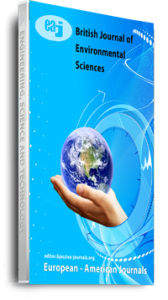Wastes from abattoirs may have significant effects on the soil and the surrounding plants in Lagos State of Nigeria where there are poor abattoir practices. Thus, this study aimed at assessing some heavy metals’ concentrations of Colocasia esculenta, Vernonia amygdalina and Amaranthus spinosus and soils collected around some selected abattoirs in Lagos State, Nigeria. Samples of C. esculenta, V. Amygdalina, A. Spinosus and soils were obtained from three different abattoirs in three local government areas of Lagos State. Heavy metal analysis was done on plants and soil samples using standard analytical procedures and mean-standard-deviation were used for analysis. Analysis of heavy metal revealed the concentration range of Lead (Pb) [0.001-0.053mg/100g]; Cadmium (Cd) [0.001-0.008mg/100g]; Manganese (Mn) [0.006-0.053mg/100g]; Cobalt (Co) [0.003-0.007mg/100g], Nickel (Ni) [0.001-0.003mg/100g]; Zinc (Zn) [0.246-0.7441 mg/100g] and Chromium (Cr) value was 0.001mg/100g in three vegetables across the three abattoirs. Also, the soil analysis showed that the concentrations range of Pb [0.110-0.123mg/100g]; Cd [0.017-0.019mg/100g]; Mn [0.340-0.695mg/100g]; Cr [0.001-0.004mg/100g]; Co [0.011-0.013mg/100g]; Ni [0.005-0.006mg/100g] and Zn [1.104-1.267mg/100g]. These metallic concentrations were below or within metallic limits set by World Health Organization and thus, are safe for consumption at time of this study. However, efforts should be made to reduce these metals in order to prevent abattoirs’ effluents accumulation. This study therefore suggest that abattoir effluents should be correctly channelled and controlled into cesspit or treated to avoid plants and surrounding soils’ heavy metal build-up.
Keywords: Abattoir, Colocasia esculenta, Heavy Metal, Vernonia amygdalina Amaranthus spinosus and soils, Waste.

